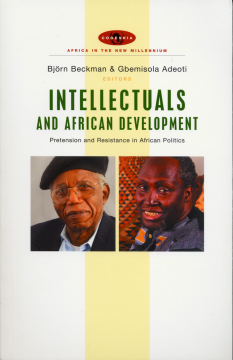
Additional Information
Book Details
Abstract
This book looks at the very different responses to the African predicament from prominent writers like Soyinka, Ngugi and Achebe, to the military men in power and the students who defy repression. It suggests that intervention by international agencies who claim to promote 'democracy' and 'empower the youth' may reinforce authoritarian attitudes and structures.
The essays in the book give voice to the outrage, ridicule and revolutionary ardour, as well as to the reformist caution, of those directly affected. The shallow pretences of those in power and the hypocrisy and arrogance of the foreign helpers are also exposed.
The book concludes that being an 'insider' or an 'outsider' is less important than being committed to listening to ordinary people.
Björn Beckman is a Research Professor in the Department of Political Science, Stockholm University. He has published extensively on African political economy and organised interests. His current work compares African trade unions and their interventions in policy and politics.
Gbemisola Adeoti is a Lecturer in the Department of English, Obafemi Awolowo University, Ile Ife, Nigeria. He has contributed to scholarly journals both within and outside Nigeria. His collection of poems Naked Soles, has just been published.
Table of Contents
| Section Title | Page | Action | Price |
|---|---|---|---|
| Contents\r | v | ||
| Predicament and response: an introduction | 1 | ||
| What went wrong? | 1 | ||
| Intellectuals and soldiers | 3 | ||
| Students, youths and citizens | 5 | ||
| Scholars and people | 7 | ||
| 1 | Psychopaths in power: the collapse of the African dream in A Play of Giants | 11 | ||
| 2 | Re-establishing the basis of social order in Africa: a reflection on Achebe’s reformist agenda and Ngugi’s Marxist aesthetics | 31 | ||
| Ngugi’s Marxist aesthetics in Petals | 32 | ||
| Achebe’s reformist agenda in Anthills | 39 | ||
| Beyond revolution and reform: a ‘third path’? | 45 | ||
| 3 | Narrating the green gods: the (auto)biographies of Nigerian military rulers | 49 | ||
| Background | 49 | ||
| Self-(re)-writing and the public sphere | 50 | ||
| Military officers’ narratives | 53 | ||
| Conclusion | 61 | ||
| 4 | Ambiguous transitions: mediating citizenship among youth in Cameroon | 69 | ||
| Ethnographic context | 71 | ||
| Youth and the Cameroon state | 73 | ||
| Elites-in-waiting or merchants of illusion? | 76 | ||
| Self-made citizens | 81 | ||
| Marginal citizens and the ‘exit option’ | 84 | ||
| Theorizing youth transition in Cameroon | 88 | ||
| Conclusion | 92 | ||
| 5 | Student radicalism and the national project: the Nigerian student movement | 98 | ||
| NANS as a national democratic force | 99 | ||
| The collapse of NANS as a progressive force: what wentwrong? | 105 | ||
| Are students still a national democratic force? | 114 | ||
| Students as custodians of the radical nationalist heritage | 117 | ||
| 6 | Transnational governance and the pacification of youth: civic education and disempowerment in Malawi | 124 | ||
| Civic education: promises and perils | 129 | ||
| Finding a NICE job | 132 | ||
| The pacification of youth | 136 | ||
| The desire for status | 138 | ||
| The supremacy of English | 142 | ||
| Educating elders | 145 | ||
| Revelations and hidden agendas | 147 | ||
| 7 | Identity and knowledge production in thefourth generation | 156 | ||
| Why is this an issue for the fourth generation? | 156 | ||
| From where do we speak? Questions of location and positionality | 157 | ||
| Unpacking ‘insider scholarship’ | 158 | ||
| Critiques of insider scholarship | 160 | ||
| Recentring insider scholarship | 162 | ||
| ‘Shared struggle’ as basis for insider scholarship | 163 | ||
| How does all this relate to the practice of scholarship? | 165 | ||
| Conclusion | 166 | ||
| Contributors | 171 | ||
| Index | 173 |
